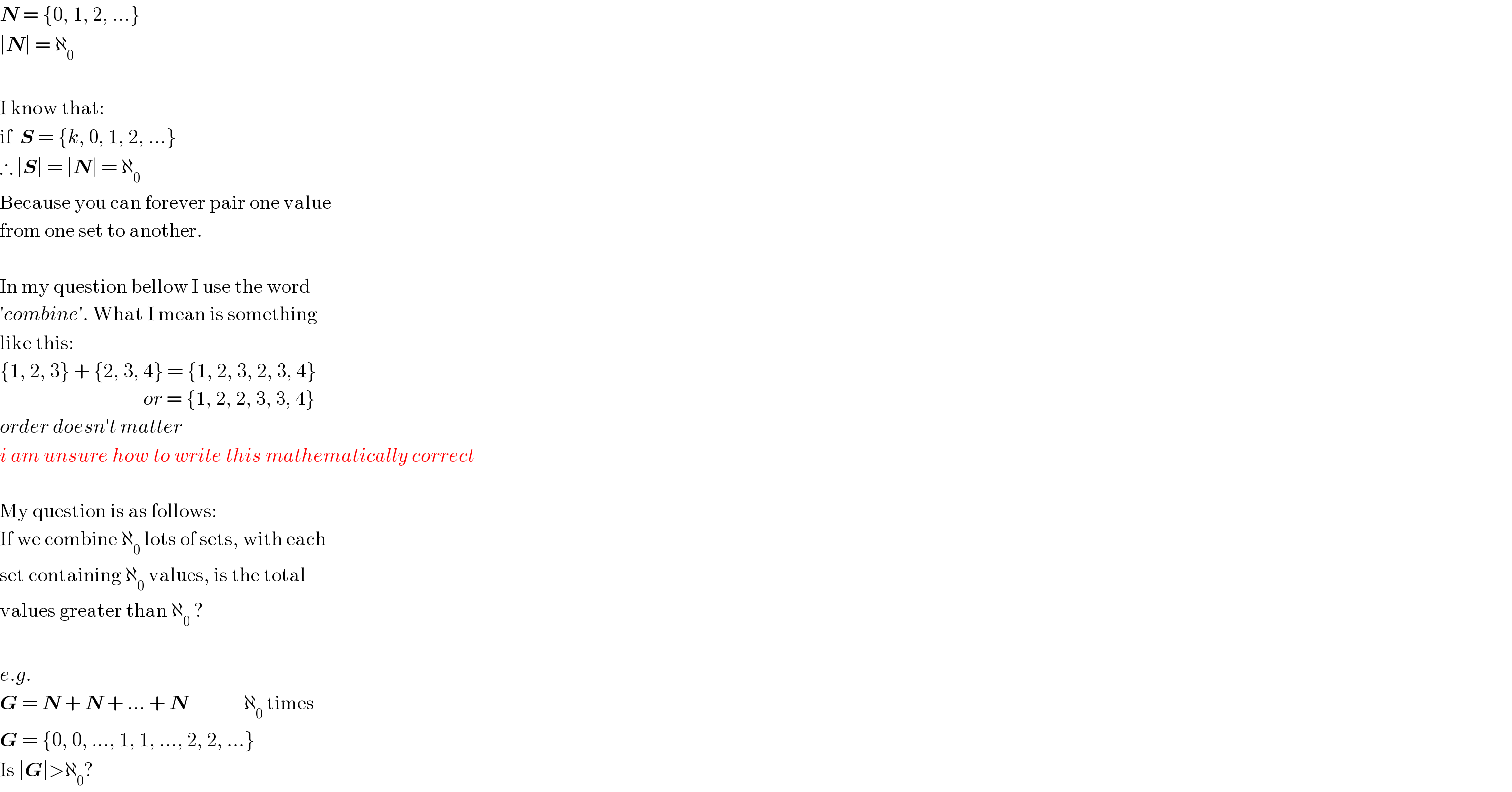
Question Number 5080 by FilupSmith last updated on 10/Apr/16

$$\boldsymbol{{N}}\:=\:\left\{\mathrm{0},\:\mathrm{1},\:\mathrm{2},\:...\right\} \\ $$$$\mid\boldsymbol{{N}}\mid\:=\:\aleph_{\mathrm{0}} \\ $$$$ \\ $$$$\mathrm{I}\:\mathrm{know}\:\mathrm{that}: \\ $$$$\mathrm{if}\:\:\boldsymbol{{S}}\:=\:\left\{{k},\:\mathrm{0},\:\mathrm{1},\:\mathrm{2},\:...\right\} \\ $$$$\therefore\:\mid\boldsymbol{{S}}\mid\:=\:\mid\boldsymbol{{N}}\mid\:=\:\aleph_{\mathrm{0}} \\ $$$$\mathrm{Because}\:\mathrm{you}\:\mathrm{can}\:\mathrm{forever}\:\mathrm{pair}\:\mathrm{one}\:\mathrm{value} \\ $$$$\mathrm{from}\:\mathrm{one}\:\mathrm{set}\:\mathrm{to}\:\mathrm{another}. \\ $$$$ \\ $$$$\mathrm{In}\:\mathrm{my}\:\mathrm{question}\:\mathrm{bellow}\:\mathrm{I}\:\mathrm{use}\:\mathrm{the}\:\mathrm{word} \\ $$$$'{combine}'.\:\mathrm{What}\:\mathrm{I}\:\mathrm{mean}\:\mathrm{is}\:\mathrm{something} \\ $$$$\mathrm{like}\:\mathrm{this}: \\ $$$$\left\{\mathrm{1},\:\mathrm{2},\:\mathrm{3}\right\}\:+\:\left\{\mathrm{2},\:\mathrm{3},\:\mathrm{4}\right\}\:=\:\left\{\mathrm{1},\:\mathrm{2},\:\mathrm{3},\:\mathrm{2},\:\mathrm{3},\:\mathrm{4}\right\} \\ $$$$\:\:\:\:\:\:\:\:\:\:\:\:\:\:\:\:\:\:\:\:\:\:\:\:\:\:\:\:\:\:\:\:\:\:\:\:{or}\:=\:\left\{\mathrm{1},\:\mathrm{2},\:\mathrm{2},\:\mathrm{3},\:\mathrm{3},\:\mathrm{4}\right\} \\ $$$${order}\:{doesn}'{t}\:{matter} \\ $$$${i}\:{am}\:{unsure}\:{how}\:{to}\:{write}\:{this}\:{mathematically}\:{correct} \\ $$$$ \\ $$$$\mathrm{My}\:\mathrm{question}\:\mathrm{is}\:\mathrm{as}\:\mathrm{follows}: \\ $$$$\mathrm{If}\:\mathrm{we}\:\mathrm{combine}\:\aleph_{\mathrm{0}} \:\mathrm{lots}\:\mathrm{of}\:\mathrm{sets},\:\mathrm{with}\:\mathrm{each} \\ $$$$\mathrm{set}\:\mathrm{containing}\:\aleph_{\mathrm{0}} \:\mathrm{values},\:\mathrm{is}\:\mathrm{the}\:\mathrm{total} \\ $$$$\mathrm{values}\:\mathrm{greater}\:\mathrm{than}\:\aleph_{\mathrm{0}} \:? \\ $$$$ \\ $$$${e}.{g}. \\ $$$$\boldsymbol{{G}}\:=\:\boldsymbol{{N}}\:+\:\boldsymbol{{N}}\:+\:...\:+\:\boldsymbol{{N}}\:\:\:\:\:\:\:\:\:\:\:\:\:\:\aleph_{\mathrm{0}} \:\mathrm{times} \\ $$$$\boldsymbol{{G}}\:=\:\left\{\mathrm{0},\:\mathrm{0},\:...,\:\mathrm{1},\:\mathrm{1},\:...,\:\mathrm{2},\:\mathrm{2},\:...\right\} \\ $$$$\mathrm{Is}\:\mid\boldsymbol{{G}}\mid>\aleph_{\mathrm{0}} ? \\ $$
